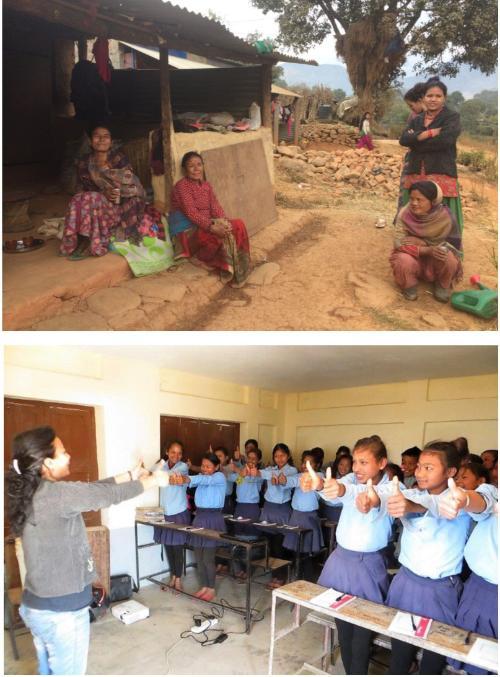Project in Nepal
Empowerment of Village Women for Detection and Control of Livestock Diseases in Nepal
Timeframe: October 2016 - March 2018
Funding: USAID
Principal investigator (PI) and lead institution
Richard A. Bowen, Colorado State University
Co-PI and collaborator institutions
- Doj Raj Khanal, Private Consultant, Kathmandu
- Nepal Agricultural Research Council
- Ministry of Livestock Development
- Himalayan College of Agricultural Sciences and Technology
Video
Results
Project Plan
 The fundamental objective of the project was to establish a comprehensive program for reporting and controlling livestock disease in Nepal, based on the empowerment of village women and interactions with the Department of Livestock Services. The goal is to implement a bottom-up approach to livestock disease monitoring that will effectively meld with the traditional top-down approach for disease control. Specific objectives and associated activities for this effort were:
The fundamental objective of the project was to establish a comprehensive program for reporting and controlling livestock disease in Nepal, based on the empowerment of village women and interactions with the Department of Livestock Services. The goal is to implement a bottom-up approach to livestock disease monitoring that will effectively meld with the traditional top-down approach for disease control. Specific objectives and associated activities for this effort were:
- Establish a rapid reporting and response network for livestock disease based on women from the communities. This approach will exploit mobile phone technology and serve multiple purposes, including the empowerment of women, estimating the burden of individual livestock diseases with an eye toward prioritizing expenditures for control, and enhancing control of livestock diseases. The response arm of the network will consist of veterinaians, para-veterinarians, and extension agents from the Department of Livestock Services; linking these two entities effectively will be key to success of the program.
- Develop or enhance the support structures necessary for success of the rapid reporting and response networks and preparation of the next generation of producers. Key capacity development efforts that will address these issues are:
- Organization of school-based livestock clubs for youth that will provide education in livestock disease recognition and control, production hygiene and food safety, and record keeping.
- Implementation of effective and affordable field and laboratory testing to support diagnostic accuracy and establish the priorities for disease control.
More Information
 October 2020 research update BOWEN VGM (Virtual General Meeting)
October 2020 research update BOWEN VGM (Virtual General Meeting)
Photo credit: R. Bowen, R. Shakya
Feed the Future Innovation Lab for Livestock Systems is part of Feed the Future
This work was funded in whole or part by the United States Agency for International Development (USAID) Bureau for Resilience, Environment and Food Security under Agreement # AID-OAA-L-15-00003 as part of Feed the Future Innovation Lab for Livestock Systems. Additional funding was received from Bill & Melinda Gates Foundation OPP#060115. Any opinions, findings, conclusions, or recommendations expressed here are those of the authors alone.





